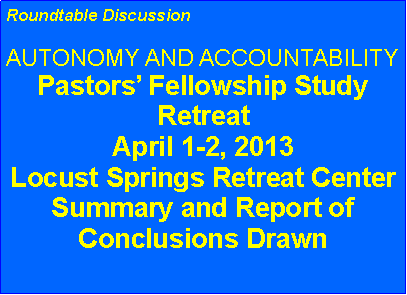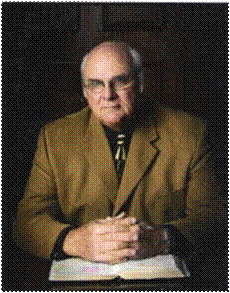
|
By Richard Bradley Evangelist, Co-Editor, Truth Matters |
|
All participants who gathered these two days appreciated greatly the privilege to have this venue in which to voice and critique our concerns about the two related subjects of Autonomy and Accountability which currently face our community of believers. All felt the importance and the urgency of the subject at hand. It was also expressed that the spirit of the discussion was that of a genuine and worshipful attitude conducted in a climate of servanthood and humility with no subtle undertones of unbiblical authority. In the words of one, “It was truly a fellowship of pastors and a joy to participate.”
All present recognized the truth expressed in Isaiah 9:6: “For unto us a child is born, unto us a son is given: and the government shall be upon his shoulder: and his name shall be called Wonderful, Counsellor, The mighty God, The everlasting Father, The Prince of Peace” (KJV).
Since “the government shall be upon His shoulder,” it follows that the governance shall also be upon His shoulder and not upon the shoulders of men. The Biblical pattern and historic view of the New Testament church is that of Holy Spirit leadership under the Lordship of the founder and builder of the church, Jesus Christ. While the congregation is autonomous in the sense that she is not to be ruled or governed by a church hierarchy, she is accountable to her pastor who, under submission, obedience, and direction of the Chief Shepherd, gives leadership in that local church. While the congregation is self-governing locally, she is not independent of or separate from all other congregations of the church of God in other locations. Rather, it was our consensus that she is to be interdependent with them and should be open, receptive, and supportive of the Spirit-led brotherhood and sisterhood of the saints.
We all agreed that there needs to be accountability both of ministers and of congregations. As with any free-standing group that has the right to define its membership, so the churches of God have the right to define and declare their constituency. Since association and inclusion in the constituency is on a voluntary basis, that group (in this case the churches of God), have a right to credential those whose standing and operation are in harmony with biblical guidelines. There are two witnesses which are given to the church to keep her on course, the Word and the Spirit. Here is where the rub comes as we grappled with accountability. How do we get immature (carnal or flesh-controlled) congregations and ministers to come under the umbrella of the Word and the Spirit and accept accountability?
After lengthy discussion it was the consensus of our study group that a credentialing body is necessary for the ministry and that a significant mentor system and process should be the backbone of such credentialing along with the reading list and documents of belief now required. If a minister wants to be voluntarily a part of this Movement and body of believers he or she should acquiesce to this mentor/reading accountability track. If they do not want to follow it, credentialing should be withdrawn, allowing them to follow what they seek in some other communion. A minister’s recognition and credentialing can be revoked by obstinate or immoral behavior; however, there seems to be a reluctance in our Movement to revoke recognition of congregations for the same reasons. If a congregation or minister is allowed to continue in such a course they bring reproach upon the entire body of believers in our communion. It appears reasonable, therefore, that the same rules should apply to congregations as to ministers. If they do not wish to comply, then recognition and credentialing should be withdrawn and they should be left to pursue their own course without any ties or recognition from our fellowship.
Each minister and congregation is to be an example of the church which was born from Jesus’ side at Calvary. The identifying mark of these entities is to be the love which Jesus charges us to demonstrate. If we indeed love the Master, we will in obedience keep His commandments, committed to Biblical and Spirit-led guidance. This requires us to be in harmony with the principles of truth set forth in the Scriptures for the church’s progress. Human structure and organization will not produce these results, only Holy Spirit leading through spiritual leadership will accomplish this. Genuine love (agape) will provide servants willing to be mentors for new ministers and for congregations as spiritual advisors. That kind of love brings patience and understanding which will keep the church on course and propel her steadily toward her destination. There was complete agreement that we clearly state that Biblical autonomy is the accepted way a congregation should operate, and that man-rule and intervention by outside sources should be minimal and by invitation only from the individual congregation and its Spirit-led pastor. It is not to be by a unilateral intervention of any credentialing entity.
If a congregation or minister does not wish to subject him/herself to our mutual mission to be the body of Christ and continues in a rogue fashion and attitude, defying accountability to the whole body of believers, that congregation or minister should be cut loose and all recognition and credentialing be withdrawn.
Churches: Autonomous, but Interdependent
The churches of the New Testament seem to be autonomous. But it is still true that the congregational autonomy is never taught, nor is democratic decision-making prescribed. It may be that the old Quaker meeting is closer to the New Testament practice.
Congregations were interdependent, rather than totally independent of one another. “Paul expects one church to serve another with the gifts that have been specially bestowed on it. If Jerusalem has served the Gentile churches with the ‘spiritual’ gifts of preaching, it has been served by them with the ‘fleshly’ gifts of the collection (Rom. 15:27). On the other hand, the faith of the Gentiles is to stir up Israel on its part to take the way of faith (Rom. 11:11).”
--Kenneth E. Jones in Theology of Holiness and Love (Lanham, MD: University Press of America, 1995) p. 318
|
